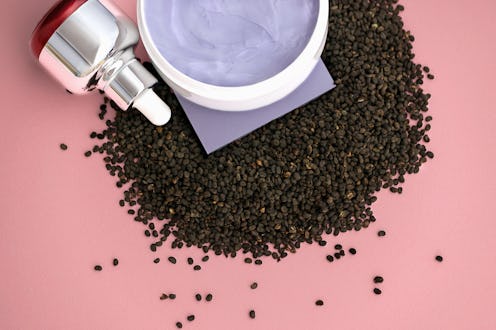
If you're a skincare geek, chances are you've dabbled with retinol. Beloved for its anti-ageing properties and ability to target acne, the Vitamin A derivative graces the bathroom cabinets of some of the biggest names in beauty, and for good reason. But retinol comes with its downsides, and the beauty industry has been quietly searching for a natural alternative for a while now. The good news is that they've found it, and bakuchiol is becoming hotter than ever. But what is bakuchiol? Here is everything you need to know about the trending skincare ingredient.
What is bakuchiol?
Put simply, bakuchiol is derived from the seeds and leaves of Eastern Asia’s ‘babchi’ plant (which is formally named the psoralea corylifolia plant). Although we are seemingly just coming round to the benefits of the ingredient, as healthcare news website MDedge notes, it has actually been used in Ayurvedic and Chinese treatments for literally hundreds of years. The reason why it has been so commonly used is because of its many benefits; it supposedly has anti-inflammatory, antioxidant, and antibacterial properties, MDedge reports. Impressive, huh?
What are the benefits of bakuchiol?
While retinol comes from Vitamin A, bakuchiol is derived from a natural plant. However, a 2014 study by the Society of Cosmetic Scientists which compared the two found they have incredibly similar effects, including an increase in cell turnover, collagen production stimulation, reduced hyperpigmentation, and smoother fine lines and wrinkles.
However, unlike retinol, bakuchiol provides skin with these benefits without any uncomfortable side effects. As much as we love retinol, as Marie Claire notes, some skin types struggle with the ingredient, particularly in terms of sensitivity, redness and irritation. Retinol also increases the skin's sensitivity to the sun, meaning it's best used at night, and you have to really amp up your SPF usage the following day.
Bakuchiol, on the other hand, is different, and can potentially be used by those with more sensitive skin. "Unlike classic retinol formulations, bakuchiol is not irritating and can be used safely during pregnancy," explains Ksenia Selivanova from expert led skincare consultancy Lion/ne.
She continues: "with a rise of sensitised skin due to pollution, sun exposure, lifestyle, and overuse of active products brands are trying more than ever to gap the bridge between sensitivity and “hard working” ingredients." Bakuchiol has bridged the gap between retinol and sensitive skin.
Selivanova does however stress that bakuchiol shouldn't completely overshadow its more well-known cousin: "retinol has over 40 years of clinical trials behind it - ten times that of bakuchiol," she says. "So don’t start hating on our beloved retinol...this is just another option."
How should I apply bakuchiol?
While retinol is usually best applied at night, bakuchiol can be used in the morning or at night, as it does not increase the skin's sensitivity to the sun. As it is also brilliant for sensitive skin, you don't need to build up to using it or start slow; you can dive right in.
There are many different types of products that use bakuchiol, from serums to toning pads, and many brands are beginning to release their own versions to meet the new-found demand. Here are a few of my favourites: